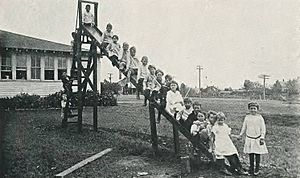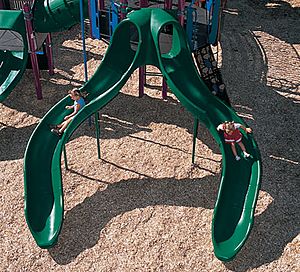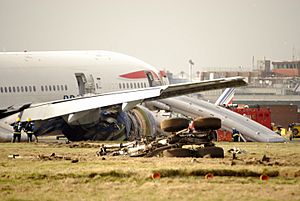Playground slide facts for kids
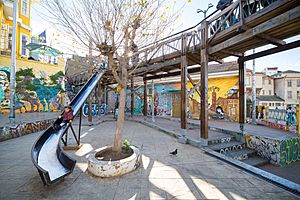
Playground slides are popular play equipment found in parks, schools, playgrounds, and even backyards! A slide is a great example of a simple machine called an inclined plane. This means it's a flat surface that's tilted, making it easier to move things up or down. For slides, it makes sliding down super fun! Slides can be flat, half-round, or even fully enclosed tubes to help keep kids safe. They are usually made from smooth plastic or metal and can be straight or wavy. To use a slide, a child climbs up a ladder or stairs, sits at the top, and then slides down the chute!
In different places, slides have different names. In Australia and New Zealand, people might call them a slippery slide, slipper slide, or slippery dip. If you're in the New York City area, you might hear the term sliding pond or sliding pon. And in the Philadelphia area and other parts of the Mid-Atlantic, they often say sliding board.
When Did Slides First Appear?
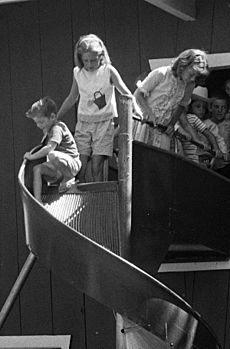
It's a bit tricky to say exactly when the very first playground slide was invented! One of the earliest known slides was set up in a playground in Washington D.C. around 1902 or 1903. Around the same time, in May 1903, a bamboo slide opened at Coney Island, a famous amusement park. So, it's not clear which one came first – the playground slide or the amusement park slide!
Early slides sometimes had fun nicknames. People called them "Slide, Kelly, Slide" (after a song), "Helter Skelter" (like a famous slide at Coney Island), or "Shoot the Chutes" (named after popular water slides).
Some people believe the playground slide was invented by Johnny McSlide and installed in Wicksteed Park in England in 1922. However, there are records of other early slides. For example, there was a rooftop slide in New York City around 1900, and a nursery slide for young Tsar Alexei in Russia around 1910. A large 45-foot slide was installed at the Smith Memorial Playground in Philadelphia in 1904. An old book from 1909, called "Playground Technique and Playcraft," even gave instructions on how to build a metal playground slide!
What Kinds of Slides Are There?
Slides come in many different shapes and sizes! Here are some common types you might see:
- A spiral slide wraps around a central pole, like a corkscrew, letting you spin as you go down.
- A wavy slide has bumps and dips in its shape, giving you a fun up-and-down feeling as you slide.
- A tube slide is completely enclosed, like a tunnel. It can be straight, curved, or even have bumps inside!
- A straight slide is the simplest kind, just a flat surface that goes down at an angle.
- Amusement-park slides are much bigger versions of playground slides. They are often very tall and might have several sliding lanes next to each other. Sometimes, you even get a special sack to sit on to make you go faster and protect your clothes by reducing friction (the rubbing force that slows you down).
- Drop slides are super exciting (and a bit scary!) because they have a very steep, almost vertical, drop. They are sometimes called "death slides" or "free-fall slides" because of how fast you go!
- Water slides are found at water parks or pools. Water flows down them, making them super slippery and extra fun!
Slides can also be grouped in two main ways. Free-standing slides are slides that stand on their own. Composite slides are those that are connected to other parts of a playground, like a climbing frame or a bridge.
-
An inflatable slide at an air show in England.
See also
 In Spanish: Tobogán para niños
In Spanish: Tobogán para niños


